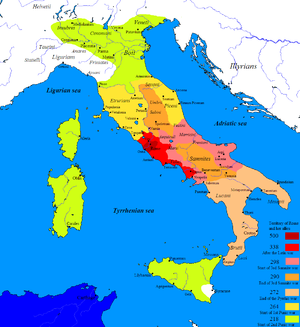
290 BC
Encyclopedia

Roman calendar
The Roman calendar changed its form several times in the time between the founding of Rome and the fall of the Roman Empire. This article generally discusses the early Roman or pre-Julian calendars...
. At the time it was known as the Year of the Consulship of Rufinus and Dentatus (or, less frequently, year 464 Ab urbe condita
Ab urbe condita
Ab urbe condita is Latin for "from the founding of the City ", traditionally set in 753 BC. AUC is a year-numbering system used by some ancient Roman historians to identify particular Roman years...
). The denomination 290 BC for this year has been used since the early medieval period, when the Anno Domini
Anno Domini
and Before Christ are designations used to label or number years used with the Julian and Gregorian calendars....
calendar era
Calendar era
A calendar era is the year numbering system used by a calendar. For example, the Gregorian calendar numbers its years in the Western Christian era . The instant, date, or year from which time is marked is called the epoch of the era...
became the prevalent method in Europe for naming years.
Roman Republic
- RomanRoman RepublicThe Roman Republic was the period of the ancient Roman civilization where the government operated as a republic. It began with the overthrow of the Roman monarchy, traditionally dated around 508 BC, and its replacement by a government headed by two consuls, elected annually by the citizens and...
general and consulConsulConsul was the highest elected office of the Roman Republic and an appointive office under the Empire. The title was also used in other city states and also revived in modern states, notably in the First French Republic...
, Manius Curius Dentatus, gains a decisive victory over the Samnites, thereby ending a war that has lasted 50 years. He also reduces the SabineSabineThe Sabines were an Italic tribe that lived in the central Appennines of ancient Italy, also inhabiting Latium north of the Anio before the founding of Rome...
insurgents to submission, their territory is annexed and they are granted civitas sine suffragio ("citizenship without the right to vote"). The Samnites are recognised by the Romans as autonomous allies. The Samnites are forced to give up some of their land to the Romans as compensation.
Egypt
- BereniceBerenice I of EgyptBerenice I was a Greek Macedonian noblewoman and through her marriage to Ptolemy I Soter, became the first Queen of the Ptolemaic dynasty of Egypt.-Family:...
, wife of PtolemyPtolemy I SoterPtolemy I Soter I , also known as Ptolemy Lagides, c. 367 BC – c. 283 BC, was a Macedonian general under Alexander the Great, who became ruler of Egypt and founder of both the Ptolemaic Kingdom and the Ptolemaic Dynasty...
, is proclaimed queen of EgyptAncient EgyptAncient Egypt was an ancient civilization of Northeastern Africa, concentrated along the lower reaches of the Nile River in what is now the modern country of Egypt. Egyptian civilization coalesced around 3150 BC with the political unification of Upper and Lower Egypt under the first pharaoh...
. Ptolemy has the city of BereniceBerenice (port)Berenice or Berenice Troglodytica , also known as Baranis and now known as Medinet-el Haras, is an ancient seaport of Egypt on the west coast of the Red Sea...
built on the Red SeaRed SeaThe Red Sea is a seawater inlet of the Indian Ocean, lying between Africa and Asia. The connection to the ocean is in the south through the Bab el Mandeb strait and the Gulf of Aden. In the north, there is the Sinai Peninsula, the Gulf of Aqaba, and the Gulf of Suez...
in her honour. It becomes a great emporium for Egyptian trade with the East.

